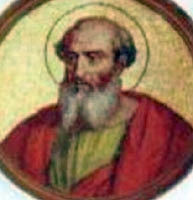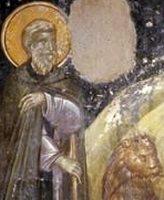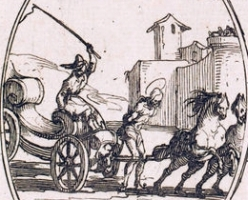Saint Mark the Ascetic
Also known as
• Mark the Wrestler
• Mark the Hermit
Profile
Fifth century monk. May have been a disciple of Saint John Chrysostom, and friend of Saint Nilus the Ascetic, but it's questionable. Wrote over 200 texts on spiritual law, baptism, repentance, grace and holy works, and other topics. May have been the abbot at Ancyra, but later became a desert hermit. Opposed the Messalian heresy; it taught that each person has a personal demon that even baptism cannot conquer. Mark wrote against the Nestorians. Said to have known the Scriptures by heart. Legend says he once cured a hyena that had been born blind; not sure why.
Saint Piran
புனித_பைரன் (-480)
மார்ச் 05
இவர் (#StPiran) அயர்லாந்தைச் சார்ந்தவர்.
தனது உயர் கல்வியை உரோமையில் கற்று, சொந்த நாட்டிற்குத் திரும்பிய இவர் பல வல்ல செயல்களைச் செய்தார். குறிப்பாக இவர் நோயாளர்கள் பலரை நலமாக்கினார்.
இதனால் இவர்மீது பொறாமை கொண்ட மன்னன் தனது வீரர்களிடம், இவரது கழுத்தில் எந்திரக் கல்லைக் கட்டிக் கடலில் ஆழ்த்தச் சொன்னார். அவர்களும் அவ்வாறே செய்தார்கள். ஆனால், இவர் கடலில் மூழ்காமல் கோன்வாலுக்கு அருகில் இருந்த கடற்கரையில் ஒதுங்கினார்.
அங்கு இவர் ஒரு கோயிலைக் கட்டி, கடவுளின் வார்த்தையை மக்களுக்கு அறிவித்து வந்தார். இதனால் பலரும் இயேசுவில் நம்பிக்கை கொண்டார்கள்.
இவ்வாறு கடவுளின் வார்த்தையை மக்களுக்கு அறிவித்து, வல்ல செயல்களைச் செய்து வந்த இவர் 480 ஆம் ஆண்டு இறையடி சேர்ந்தார்.
Also known as
Peran, Perran, Pyran, Piranus
Profile
Piran's family origins are obscure; tradition says he came from Ireland. Spent his youth in south Wales where he founded a church in Cardiff. Received religious schooling at the monastery of Saint Cadog at Llancarfon, where he met Saint Finnian of Clonard. The two returned together to Ireland where Finnian founded six monasteries, including his most famous one at Clonard. Piran lived there before Saint Enda on Aran Island, and then Saint Senan on Scattery Island. He founded his own community at Clonmacnoise, "Ireland's University".
Cornish legend says Piran was captured in his old age by pagan Irish, jealous of his miraculous powers, especially his ability to heal. They tied a millstone around his neck, and threw him off a cliff into the sea during a storm. As Piran hit the water the storm abated and the millstone bobbed to the surface like a cork. On his stone raft, Piran sailed for Cornwall, landed at Perran Beach, built a small chapel on Penhale Sands, and made his first converts - a badger, a fox, and a bear. He lived there for years as a hermit, working miracles for the locals.
Piran founded churches at Perran-Uthno and Perran-Arworthal, a chapel at Tintagel, and a holy-well called the "Venton-Barren" at Probus. He made trips to Brittany where he worked with Saint Cai. Arthurian tradition from Geoffrey of Monmouth says he was chaplain to King Arthur, and Archbishop of York after Saint Samson was exiled by Saxon invasions, though it is doubtful he ever took up his See.
Piran's patronage of Cornwall derives from his popularity with the Cornish tin-miners. Legend says that Piran discovered tin in Cornwall when he used a large black rock to build a fireplace, and found that the heat made a trickle of pure white metal ooze from the stone. He shared this discovery with the locals, providing the Cornish with a lucrative living. The people were so delighted that they held a sumptuous feast where the wine flowed like water. Piran was fond of the odd tipple, resulting in the Cornish phrase "As drunk as a Perraner". The trickled of white metal upon a black background remains as the White Cross of Saint Piran on the Cornish National flag.
Piran died at his little hermitage near the beach. His relics were a great draw to pilgrims but, due to inundation by the sands, they were moved inland to the parish church of Perran-Zabulo, built to house them
Died
5 March 480 of natural causes
Saint John Joseph of the Cross
சிலுவையின் புனிதர் ஜான் ஜோசப்
குரு (Priest):
பிறப்பு: ஆகஸ்ட் 15, 1654
இஸ்ச்சியா தீவு, நேப்பிள்ஸ் அரசு
இறப்பு: மார்ச் 5, 1739 (வயது 84)
இஸ்ச்சியா தீவு, நேப்பிள்ஸ் அரசு
ஏற்கும் சமயம்:
ரோமன் கத்தோலிக்க திருச்சபை
அருளாளர் பட்டம்: மே 24, 1789
திருத்தந்தை ஆறாம் பயஸ்
புனிதர் பட்டம்: மே 26, 1839
திருத்தந்தை பதினாறாம் கிரகோரி
நினைவுத் திருநாள்: மார்ச் 5
பாதுகாவல்: இஸ்ச்சியா தீவு (Ischia)
"கார்லோ கெடானோ கலோஸிர்டோ" (Carlo Gaetano Calosirto) எனும் இயற்பெயர் கொண்ட புனிதர் சிலுவையின் ஜான் ஜோசப், ஒரு இத்தாலி நாட்டு கத்தோலிக்க குருவாவார். இவர், "ஃபிரான்சிஸ்கன் இளம் துறவியர் சபையின்" (Order of Friars Minor) ஒப்புக்கொள்ளப்பட்ட உறுப்பினர் (Professed Member) ஆவார். அதிசயங்கள் செய்வதிலும் எளிய வாழ்க்கையாலும் பிரசித்தி பெற்ற இவர், துறவறப் புகுநிலையினரின் தலைவராக (Master of Novices) நியமனம் செய்யப்பட்டார். இவர், தமது பிறப்பிடமான இஸ்ச்சியா தீவின் (Ischia) பாதுகாவலர் ஆவார்.
"கார்லோ கெடானோ" நேப்பில்ஸி'ன் (Naples) கடல் பகுதியான இஸ்ச்சியா (Ischia) தீவில் பிறந்தவர் ஆவார். தமது பதினாறு வயதின் முன்பே “சிலுவையின் ஜான் ஜோசப்” என்ற மதப் பெயரை ஏற்றவாறு, கட்டுப்பாடுகளைக் கடுமையாக கடைபிடிக்கும் "ஃபிரான்சிஸ்கன் இளம் துறவியர் சபையில்" (Order of Friars Minor) இணைந்தார். இவர், "புனிதர் அல்கான்டரா நகரின் பீட்டர்" (Saint Peter of Alcantara) என்பவரின் "சீர்திருத்த இயக்கத்தினைப்" பின்பற்றிய முதல் இத்தாலியர் ஆவார்.
இவரது தூய்மையின் புகழானது, இவர் குருத்துவ அருட்பொழிவு பெறுமுன்னரே "அஃபிலா" (Afila) என்னுமிடத்தில் புதிய துறவியர் மடம் ஒன்றினைக் கட்டும் பணிகளைக் கண்காணிக்கும் பொறுப்பினை இவருக்குத் தர இவரது மடத்தின் தலைமைத் துறவியரை தூண்டியது.
கி.பி. 1674ம் ஆண்டு, இவர் கத்தோலிக்க குருவாக குருத்துவ அருட்பொழிவு பெற்றார். இவரது கீழ்ப்படிதலும், தாழ்ச்சியும் இவருக்கு பல பதவிகளைப் பெற்றுத் தந்தது. துறவறப் புகுநிலையினரின் தலைவராகவும் பாதுகாவலராகவும் பொறுப்புகள் இவரைத் தேடி வந்தன. துறவு மட தலைவராக இருப்பினும் அவர் சமையலறையில் உதவிகளோ பணிகளோ செய்வதிலும், விறகு கொண்டுவருவதிலும், துறவியரின் தேவைகளுக்கு தண்ணீர் கொண்டு வருவதிலும் தயக்கம் காட்டியதில்லை. மாறாக அனைத்துப் பணிகளையும் செய்தார்.
இஸ்ச்சியா தீவில் உள்ள 'ஆர்கோனீஸ் கோட்டை'யில் (Aragonese Castle) இவர் பெயரால் சிறு தேவாலயம் உள்ளது.
Also known as
• Carolo Gaetano Calosinto
• Giovan Giuseppe della Croce
• Giovanni Giuseppe Calosinto of the Cross
• John Joseph Calosinto
Profile
Joined Franciscans at age 16. Ascetic. First Italian to follow the reform movement of Saint Peter Alcantara who sought to make the Order more devoted to penance and austerity. John had such a reputation for holiness that his superiors put him in charge of establishing a new friary before he was ordained. He joined the work crew, serving as a hod carrier, then a mason. Novice master, guardian, and provincial of the Order. When his term as provincial expired, he dedicated himself to hearing confessions and practising mortification, two concerns contrary to the spirit of the dawning Age of Enlightenment. Had the gifts of prophecy and healing, and would swoon into ecstasies; known to levitate and bilocate.
Born
15 August 1654 at Ischia, Naples, Italy as Carolo Gaetano Calosirto
Died
5 March 1734 of natural causes
Canonized
26 May 1839 by Pope Gregory XVI
Saint Kieran
Also known as
• Kieran of Saighir
• Kieran of Seirkeiran
• Kieran the Elder
• Kieran Saighir
• Kieran mac Luaigne
• First-born of the Saints of Ireland
• Ceran, Chierano, Ciarán, Ciarano, Ciaranus, Kenerin, Kerrier, Kevin, Kieren, Kiernan, Kieron, Kyran, Queran, Queranus
Additional Memorial
6 January as one of the Twelve Apostles of Ireland
Profile
Convert to Christianity. Pilgrim to Rome, Italy. Ordained by Saint Patrick. First Bishop of Ossory, Ireland. Founder of Saighir monastery. Sometimes confused with Saint Piran of Cornwall. Several healing wells were named for Kieran.
Born
Corca-Laighde (modern Cape Clear), Ireland
Died
c.530 of natural causes
Name Means
• Little Dark One
• Dark Prince
• Dark Haired One
Pope Saint Lucius I
Also known as
Loukis
Profile
Chosen 22nd pope. Noted for his ascetic lifestyle, even while on the throne. Forbade men and women not related by blood to live together. Decreed that clergy should not live with deaconesses even if given lodging for reasons of charity. Exiled briefly during the persecution of Emperor Gallus. Condemned the Novatian heresy.
Born
Rome, Italy
Papal Ascension
25 June 253
Died
• 5 March 254 at Rome, Italy of natural causes
• buried at Saint Callistus catacomb
• relics transferred to the church of Saint Cecilia in Trastevere, Rome in 821
• some relics transferred to Roskilde, Denmark c.1100
• his head placed in a reliquary bust in the Saint Ansgar cathedral at Roskilde in 1910
Blessed Lazër Shantoja
Profile
Studied at the Pontifical French Seminary, and then theology in Innsbruck, Austria. Ordained on 29 May 1915 as a priest of the archdiocese of Shkodrë-Pult, Albania. Noted preacher. Secretary to Archbishop Lazare Mjeda. Imprisoned, tortured and executed in the anti–Christian persecutions of the Albanian Communist government. Martyr.
Born
2 September 1892 in Shkodrë, Albania
Died
shot on 5 March 1945 in Tiranë, Albania
Beatified
• 5 November 2016 by Pope Francis
• beatification celebrated at the Square of the Cathedral of Shën Shtjefnit, Shkodër, Albania, presided by Cardinal Angelo Amato
Blessed Christopher Macassoli of Vigevano
Also known as
• Kristoffer Macassoli av Vigevano
• Cristoforo Macassoli
Profile
Born to the Italian nobility. Entered the Franciscans at age 20. Priest. Founded the monastery of Santa Maria delle Grazie at Vigevano, Italy c.1475, which became a point of pilgrimage for those seeking spiritual advice. Worked with Blessed Pacificus Ramoth of Carano.
Born
c.1415 in Milan, Italy
Died
• 5 March 1485 at Vigevano, Italy of natural causes
• buried in the abbey church of Santa Maria delle Grazie
• relics translated to the cathedral of Vigevano in 1810
Beatified
23 July 1890 by Pope Leo XIII (cultus confirmed)
Blessed Ion Costist
Also known as
• Ion Kostist
• John Kostistk
• Geremia of Wallachia
• Ieremia of Wallachia
• Jeremiah of Valachia
Profile
A pious boy raised in Romania, he emigrated to Italy at age 19 because he thought the greatest Christians could be found there. Franciscan lay brother, taking the name Jeremiah. He developed a ministry of caring for the poor, sick and crippled, begging alms that always went to the poor.
Born
29 June 1556 in Zaxo, Suceava, Romania
Died
5 March 1625 in Naples, Italy of natural causes
Beatified
30 October 1983 by Pope John Paul II
Saint Virgilius of Arles
Also known as
Virgil
Profile
Educated at the monastery at Lerins on the island of Saint Honorat. Monk. Abbot at Lerins. Abbot at Saint-Symphorien at Autun, France. Archbishop of Arles, France, appointed by Pope Saint Gregory the Great. Papal vicar in Gaul. Ordained Saint Augustine of Canterbury. Had to be reprimanded by Saint Gregory for coercing Jews, and allowing their forced "conversion". Constructed several churches in Arles.
Born
6th century Gascony, France
Died
• c.618 of natural causes
• miracles reported at his tomb
Saint Gerasimus of Palestine
Also known as
• Gerasimus of Lycia
• Gerasimus of the Jordan
• Gerasimos of...
Profile
Monk at Lycia, Asia Minor. Hermit. He moved to Palestine where c.451 he founded a house near the Dead Sea, and then c.475 another one on the River Jordan near Jericho that later grew to great importance and spread monasticism throughout the region.
Born
Lycia
Died
c.475 of natural causes
Blessed Ponzio of Villeneuve
Also known as
Ponce
Profile
Benedictine monk. Abbot of the abbey of Sant'André in Villeneuve-lès-Avignon, France from 1063 to 1087. His brother monks included his blood brother and his father. The only biography of him has little biography, but a long list of miracles he performed.
Died
• 24 or 26 (records vary) March 1087 at the abbey of Sant'André in Villeneuve-lès-Avignon, France of natural causes
• buried in the abbey church
• relics re-discovered in 1887
• relics re-located to the parish church of Villeneuve, France
Saint Eusebius of Cremona
Profile
After hearing Saint Jerome speak in Rome, Italy, Eusebius accompanied the translator to the Holy Land. Made the pilgrimage with Saint Paula and Saint Eustochium, and lived in Bethlehem. Raised funds in Dalmatia and Italy to fund a hostel for poor pilgrims, and donated the proceeds from the sale of his own property in Cremona, Italy. Abbot in Bethlehem.
Born
at Cremona, Italy
Died
c.423 of natural causes
Saint Conon of Pamphylia
Also known as
• Conon the Gardener
• Conon of Palestine
• Conon of Magydos
• Conone...
Profile
Gardener at the imperial palace at Magydos, Pamphylia (in modern Turkey). Martyred in the persecutions of Decius.
Died
nails were driven through his ankles and he was forced to run ahead of a chariot until he collapsed and it ran over him, c.251 at Pamphylia (part of modern Turkey)
Saint Adrian of Caesarea
Also known as
Adrianus, Hadrian
Profile
Travelled from Batanaea to Caesarea in Palestine to visit and minister to the Christians there. Martyred with Saint Eubulus in the persecutions of governor Firmilian.
Died
beheaded on 5 March 308 at Caesarea, Palestine
Saint Elouan of Brittany
Also known as
Elouen, Elowan, Eluen, Elven, Llywan, Loan, Louan, Louen, Louenn, Luan, Youen, Youenn
Profile
Fifth century monk and evangelist in Armorique, an area of modern Brittany, France.
Born
Ireland
Died
a chapel and fountain are located at the site of his tomb
Blessed Giovanna Irrizaldi
Profile
Mercedarian nun in the monastery of Saint Joseph in Nalan, Asturia, Spain. Known as a miracle worker, she could travel across the sea by streteching a white veil over the water and riding it.
Died
buried at the Mercedarian monastery of Saint Joseph in Nalan, Asturia, Spain
Blessed Romeo of Limoges
Also known as
Romaeus
Profile
Carmelite lay brother of Limoges, France. Pilgrim companion of Saint Avertanus of Limoges to Rome, Italy and the Holy Lands, but died en route. The tale of their travels, lavishly and piously expanded, was very popular in the years after their deaths.
Died
1380 at Lucca, Italy of plague while on pilgrimage
Saint Theophilus of Caesarea
Profile
Bishop of Caesarea in Palestine. Opposed the Quartodecimans, a sect that advocated commemorating Easter on Passover, whether that was Sunday or not.
Died
c.195 of natural causes
Saint Carthach the Elder
Also known as
• Carthach Mc Erbthaide
• Carthage, Carthac, Cartaco
Profile
Descendant of a king. Bishop of Ossory, Ireland and Munster, Ireland. Spiritual teacher of Saint Carthage the Younger.
Born
Irish
Died
c.540 of natural causes
Blessed Conrad Scheuber
Also known as
Konrad
Profile
Grandson of Saint Nicholas of Flüe. Hermit at the hermitage of Saint Nicholas, and then at Wolffenschiessen.
Born
1481 in Altfellen, Switzerland
Died
5 March 1559 in Bettelruti, Switzerland of natural causes
Blessed Roger
Profile
A spiritual student of Saint Francis of Assisi, he joined the Franciscans in 1216. Miracle worker. Had the gift of prophecy.
Died
1236 in Spain of natural causes
Saint Oliva of Brescia
Profile
Martyred in the persecutions of Hadrian.
Died
• 138
• relics at Saint Afra's church, Brescia, Italy
Saint Phocas of Antioch
Profile
Martyred in the persecutions of Emperor Licinius.
Died
drowned in his bath c.320 at Antioch
Blessed Claudius I of Auxerre
Also known as
Claude
Profile
Seventh century bishop of Auxerre, France.
Saint Clement of Santa Lucia
Profile
Abbot of Santa Lucia Abbey in Syracuse, Sicily.
Died
c.800
Saint Colman of Armagh
Profile
Fifth century disciple of Saint Patrick.
Died
buried beside Saint Patrick
Saint Eusebius the Martyr
Profile
One of a group of ten martyrs who died in a group in North Africa.
Saint Caron
Profile
Bishop. A church at Tregaron, Wales is named for him.
Martyrs of Africa
Profile
A group of 304 Christians martyred together for their faith. We know nothing else about them but five of their names Eusebius, Evolus, Hadrian, Julian and Octavian.
Died
254 in Africa, exact location and date unknown
Dietmar von Minden
Dietmar von Minden, also known as Thietmar or Thiemo, was the Bishop of Minden from 1185 or 1186 until his death in 1206. Here's some information about him:
Life and Work:
He was originally named Thietmar, which means "famous among the people" in Old High German. The name is now commonly referred to as Dietmar.
He hailed from Bavaria, Germany.
He was known for his virtuous and ascetic lifestyle, leading the Minden church with wisdom and prudence.
During his reign, he received permission from King Heinrich VI (later Emperor) to exploit silver mines discovered near Minden.
He also consecrated the Marienwerder Monastery in 1200.
Legacy:
He is considered a saint by the Catholic Church and is venerated as "Blessed Thietmar."
His feast day is celebrated on March 5th, the anniversary of his death.
A sculpture of him can be found in the Minden Cathedral.
Orante of Ortucchio
Orante of Ortucchio was a young monk who lived in the 15th century. He is venerated as a saint by the Catholic Church.
Life and Work:
Orante was born in Calabria, Italy, around the year 1400.
He was a pilgrim who traveled throughout Italy, living on alms.
In 1431, he arrived in Ortucchio, Abruzzo, and fell ill.
He took shelter in a church, where he died on March 5th.
After his death, miracles were attributed to his intercession.
He was beatified in 1772 and canonized in 1920.
Legacy:
Orante is the patron saint of Ortucchio.
His feast day is celebrated on March 5th.
A shrine dedicated to him is located in Ortucchio.














